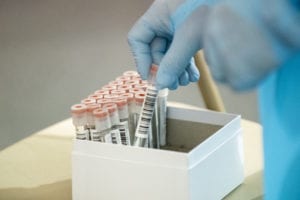Who is a member?
Our members are the local governments of Massachusetts and their elected and appointed leadership.
Mass Innovations, From The Beacon, November 2020

A technician collects COVID-19 testing swabs from students in Gantcher Center as part of fall semester arrival protocols at Tufts University on August 27, 2020. (Photo courtesy Alonso Nichols/Tufts University)
Tufts University and the cities of Medford and Somerville on Oct. 29 announced they have entered into a novel partnership that will bring COVID-19 surveillance testing to the cities’ public school systems.
The program will use a new, more efficient pooled testing method developed by Tufts in collaboration with Broad Institute of MIT and Harvard University. Program leaders say the new method could improve and expedite the communities’ ability to return to and maintain in-person education.
The program, developed and validated by Tufts, will enable the Medford and Somerville school districts to administer tests to students, faculty and staff for approximately one-third of the cost of individual testing.
The program is currently scheduled to begin in January; details are being finalized between Tufts and both cities.
For the month of December, the university has agreed to support individual testing of Medford and Somerville teachers, custodial and administrative staff, health professionals, and other student-facing essential personnel working in person in the schools, as well as students learning onsite. The university will split the cost with the cities.
In a statement, Tufts University President Anthony Monaco, a renowned geneticist who designed the strategy, said, “This cost-effective solution provides a way for local school districts to hold in-person instruction while confidently knowing they will be able to identify and control potential spread of the virus.”
The frequent and systemwide testing of school staff and students will increase identification of carriers – particularly those who are asymptomatic – thereby allowing the schools to intervene early and take steps to stem the virus from spreading as widely as it might otherwise.
“It is not enough to simply reopen our schools. We must open them as safely as possible and create the conditions that will help keep them open,” said Somerville Mayor Joseph Curtatone. “No student or family benefits when new virus outbreaks cause schools to see-saw from open to closed and back again. This universal testing plan plus the robust contact tracing we are putting in place is designed to break that cycle and better protect student and staff health.”
Medford Mayor Breanna Lungo-Koehn added, “Our school staff testing partnership with Tufts has allowed us to get our teachers and students back into the classroom with the added safety of knowing about a potential staff exposure in our schools, and with the ability to be proactive in our efforts at containing the spread of COVID-19.”
Booth mayors expressed their appreciation to Tufts.
Here’s how the new program will work:
• Under the direction of school staff and/or EMTs, teachers and high school students will sample the front part of their noses with a noninvasive swab; PK-8 students will be swabbed by a nurse or EMT.
• Eight swabs will be packaged into a single tube and sent to Broad Institute, which will analyze the group of swabs together.
• If the pool of samples comes back positive, all the people in that pool will be retested individually, which will enable health authorities to isolate the positive case(s) in the pool.
The cities’ health directors will manage follow-up, which will include contact tracing and isolation for positive cases, and quarantine support for close contacts according to state and federal guidelines.
Even with the retesting required after a pool tests positive, the program is less expensive than large-scale individual testing because it requires only a fraction of the analysis, according to the university and local officials.
Medford public schools reopened in a hybrid model, while Somerville schools are currently virtual, with a plan to phase in in-person classes through a hybrid model starting in early December.
Tufts will make available to each city a scalable technology platform it has developed to support the scheduling, order submission, labeling and monitoring of near real-time results from large-scale testing operations. This software platform is presently in use at Tufts and three other colleges in Massachusetts.
To develop the pooled testing program, Tufts officials said they took what they learned from the university’s own COVID-19 testing program, which has completed more than 120,000 individual tests since it began in August.